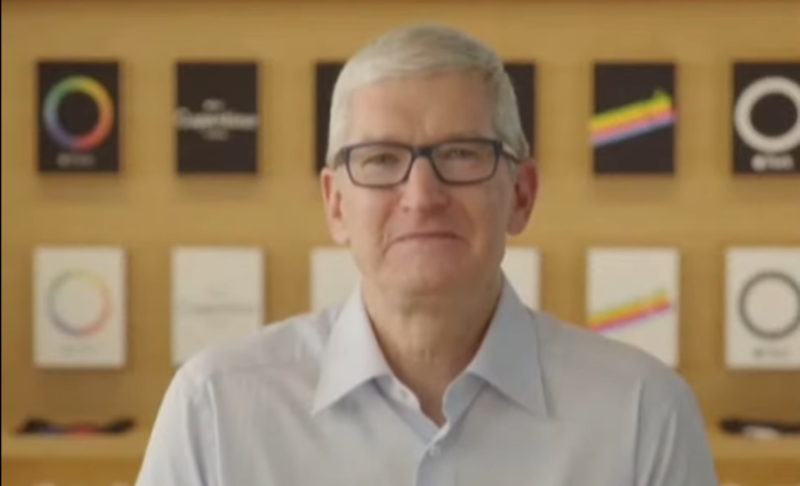
As is so common when Tim Cook speaks publicly, privacy was a major focus. His response to a question about its importance was the same one we've heard from him many times: "we see it as a basic human right, a fundamental human right." Noting Apple has been focused on privacy for a long time.
He explained:
You can think of a world where privacy is not important, and the surveillance economy takes over and it becomes a world where everyone is worried that somebody else is watching them, and so they begin to do less, they begin to think less, and nobody wants to live in a world where that freedom of expression narrows.
And when asked about regulatory scrutiny, he pointed to the GDPR as an example of regulation Apple supports and also said Apple would support further expanding privacy-related regulations.
But beyond regulations strictly centered on privacy, he wasn't as effusive. "As I look at the tech regulations that's being discussed, I think there are good parts of it and then I think there are parts of it that are not in the best interests of the user," he said.
As an example of the latter, he said "the current DMA language that is being discussed would force sideloading on the iPhone." He added:
That would destroy the security of the iPhone and a lot of the privacy initiatives that we've built into the App Store, where we have privacy nutrition labels and App Tracking Transparency... these things would not exist anymore.
Privacy watchdogs have praised Apple's App Tracking Transparency move even as advertisers have lambasted it, but the nutrition labels have been less of a hit. Many observers have pointed out that the labels are often inaccurate or incomplete.
"Android has 47 times more malware than iOS does," Cook claimed. "It's because we've designed iOS in such a way that there's one app store and all of the apps are reviewed prior to going on the store. And so that keeps a lot of this malware stuff out of our ecosystem, and customers have told us very continuously how much they value that, and so we're going to be standing up for the user in the discussions."
The interview wasn't all about regulation and privacy, though; Cook also responded to open-ended questions about Apple's future product strategy. When asked what he believes Apple's products will look like many years from now, he carefully offered the caveat that no one can really predict where things are headed:
We approach the future with great humility because we know we can't predict it. I'm not one of those people that is going to say I can see 20 years out, and 30 years out, and tell you what is going to happen. I can't. I really don't believe anyone can.
To back that point, he talked about Apple's path towards putting its own silicon in Macs:
That said, Cook named augmented reality (AR) and the intersection of health and tech as areas where he sees future potential. He said he sees AR "as a technology that can enhance life in a broad way." And once again hinting at ambitions plans for future AR hardware, he said: "We've been working on AR first with our phones and iPads, and later we'll see where that goes in terms of products."We didn't know when we were working on the chip for the iPhone that it would become the heart of the iPad, and we didn't know that it would eventually become the heart of the Mac as it just did in this past year. We didn't know that, but we kept discovering, and we kept pulling the string, and we kept our minds open about where that journey would take us, and it's taken us somewhere that's incredible and that has a great future ahead of it.
On the health side, Cook said he is "exceedingly optimistic" about the intersection of health and technology:
You know, when we started shipping the Watch, we did so thinking about it from a wellness point of view, but we put a heart rate sensor on it, and I was getting tons of emails about people that found out they had heart problems that they didn't know about it. And so we started adding more function to the Watch... and I begin to get even more notes from people that found that they'd had a problem because of this ability to continually monitor themselves. I think the idea of continually monitoring the body, much like happens in your car with warning lights and so forth, I think this is a big idea that has a long road path ahead of it. All of those things make me incredibly optimistic.
The mention of a car as inspiration drew a smirk from Brut.'s interviewer, who shortly afterwards asked if Apple plans to design and begin selling a car. "In terms of a car," Cook answered, "I've gotta keep secrets, and there always has to be something up our sleeve."
Article From & Read More ( Apple‘s Tim Cook: Sideloading is “not in the best interests of the user” - Ars Technica )https://ift.tt/2THOVZO
Tecnology
Bagikan Berita Ini














0 Response to "Apple‘s Tim Cook: Sideloading is “not in the best interests of the user” - Ars Technica"
Post a Comment